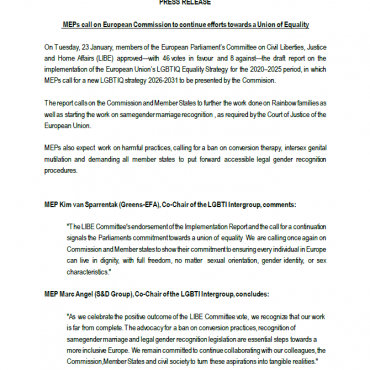Ensuring freedom of assembly for LGBT people in Moldova and Ukraine
Joint press release by ILGA-Europe, the Intergroup on LGBT Rights and Amnesty International
This May lesbian, gay, bisexual and trans (LGBT) organisations in Moldova and Ukraine are planning to hold public events. Today the court in the Moldovan capital of Chişinău ruled that the planned peaceful demonstration supporting adoption of anti-discrimination law can only take place in a park far from the city centre. The organisers, GenderDoc-M, plan to appeal this decision while rejecting the alternative location for their event. Following the court decision they have cancelled their original demonstration in the central square.

Chisinau demonstration in favour of the Pride (GenderDoc-M)
The Mayor of Chişinău requested the court to ban the demonstration on the basis of public order and morality after receiving petitions from religious and other groups opposing the LGBT event.
The authorities in both countries have previously prevented GenderDoc-M (Moldova) and LiGA (Ukraine) from peacefully exercising their right to freedom of assembly by banning LGBT public events. The European Parliament’s Intergroup on LGBT rights, ILGA-Europe and Amnesty International jointly call on the authorities in Moldova and Ukraine to respect their obligations as Members of the Council of Europe and to ensure that LGBT people are guaranteed their right to freedom of assembly and fulfil their positive duty to protect the participants even if others oppose human rights for LGBT people.
LGBT activists in Moldova have been banned from organising public events since 2005. In 2007, the Supreme Court of Moldova declared illegal the banning on a public LGBT event in 2006.
In 2009, all festival events, even those of a private nature, organised by LGBT activists in Nikolaev, Ukraine, were obstructed and banned by the city authorities. This year Nikolaev LGBT activists are planning a public event on the 16th of May.
Judgement on the Moldovan Pride event, 28 April (courtesy of Curaj.TV)
Freedom of assembly is a human right which is guaranteed by major international and European human rights instruments including: Article 21 of the International Covenant of Civil and Political Rights and Article 11 of the European Convention for the Protection of Human Rights and Fundamental Freedoms. This right is also protected in both countries’ constitutions (Article 39, Constitution of Ukraine, and Article 40, Constitution of Moldova).
The established case-law of the European Court of Human Rights on freedom of assembly has been affirmed in relation to LGBT people and the Court said that violating the right of assembly on the grounds of sexual orientation is discriminatory. The Court affirmed that the freedom of expression extends not only to the ideas and views of the majority, but also to those belonging to minorities or those that may cause shock, disagreement and opposition. Moreover, the Court has consistently ruled that if there is a risk of violence from counter-demonstrators, the state has a positive duty to protect demonstrators.
In March 2010, the governments of both, Moldova and Ukraine, approved the Council of Europe’s Recommendations on measures to combat discrimination on grounds of sexual orientation or gender identity. These Recommendations reaffirm the obligation on the Member States of the Council of Europe to ensure ‘that the right to freedom of peaceful assembly, as enshrined in Article 11 of the Convention, can be effectively enjoyed, without discrimination on grounds of sexual orientation or gender identity.’
Both countries are establishing closer links with the European Union under the EU’s Neighbourhood Policy. Accordingly, they must demonstrate a willingness to promote and protect the EU’s fundamental rights principles.
Evelyne Paradis, Executive Director of ILGA-Europe said: “We are concerned with the violations of the basic right to hold peaceful public events in Moldova and Ukraine. Both countries are aspiring to build democratic pluralistic societies and strengthen their ties with the European Union. We call on the authorities in both countries to act according to established European principles and laws. The governments of Moldova and Ukraine should respect their international human rights obligations made at the Council of Europe under which their citizens are entitled to exercising their right to free assembly without discrimination because of sexual orientation or gender identity.”
Michael Cashman and Ulrike Lunacek, Members of the European Parliament and Co-presidents of the Intergroup on LGBT Rights, declared: “The violation of fundamental human rights, such as freedom of assembly, is simply unacceptable. We will defend these rights with determination, and if necessary we will take action with the European Parliament when it comes to relations and agreements with third countries, such as Moldova and Ukraine.”
Halya Gowan, Director, Europe and Central Asia Programme, Amnesty International, said: “The persistent failure of the Moldovan and Ukrainian to respect freedom of expression and assembly of LGBT people is a serious stain on the human rights records of these two countries. LGBT people have the same rights and obligations as everybody else. It is time for the Moldovan and Ukrainian authorities to recognise this. Ensuring that the forthcoming events and marches in Chişinău and Nikolaev are authorised and able to take place in conditions of safety is an essential first step.”






